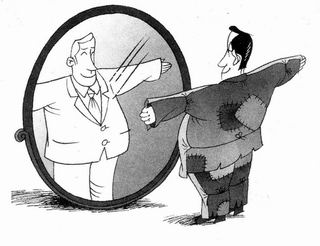One of the funniest things in any culture is when someone tries to pretend to be someone they’re not. In America, we have certain archetypes of people who we often make fun of—think hipsters or rednecks—but even funnier is someone who wants to show that they are part of a group but isn’t fooling anyone. The “faker” is full of dramatic irony: they think they’re making it, but they really aren’t.
Chinese people have been interacting with the west for a while now, and are assembling their own archetypes. People who work big-boy jobs that require speaking English, working overseas, and generally engaging the outside world have high status here. In order to get at some of that status, sometimes others will imitate those people. This situation is ripe for parody.
Enter this video (ironically also the same people who made the video in my last post): “How to Fake It.”
http://www.youtube.com/watch?v=vT7a7PCWU-A
It starts out simply enough:
“You’re a normal everyday loser. Can’t afford rent? Have no girlfriend? Is going home to see family more or less like a funeral? We’ll teach you how to fake it!”
FAKE IT TIP #1: Don’t come home too early!
Don’t come home too early from work. Pretend you’re outside the country, and insist on using Skype to communicate with friends. After all, international calling is easiest on Skype!
FAKE IT TIP #2: Black suit, red tie.
In the cities, such a get-up makes you look like you sell insurance. But back in your village or small town, such an outfit is insurance in and of itself!
FAKE IT TIP #3: Cell phones
Smartphone is a must, the bigger screen the better. Also, ringtone must be an English song!
FAKE IT TIP #4: What’s the world like?
When you go abroad, don’t talk about how things are good there. Instead, talk about how France is full of poor people, Japanese people are all rotten, English workers are unemployed, and Americans are lazy. The outside world is bad, China is great!
FAKE IT TIP #5: Gifts!
Save money wherever possible! Say you’re sorry you didn’t get any gifts, but everything abroad was made in China, and all the people on the street were Chinese too, so it was hard to buy any souvenirs.
FAKE IT TIP #6: Advise people against going abroad
If people at a high school reunion ask about the economy outside China, say it’s uniformly bad, because everyone owes China so much money! If the class beauty asks about life abroad, just tell her, “Don’t bother sending your kid to study in America. I’ve been to the schools, it’s all Chinese kids, and the few Americans there are frantically studying Mandarin.”
FAKE IT TIP #7: Don’t pay for anything yourself!
You’ll look better in the eyes of others if you use other people’s credit cards, spend other people’s money, drive other people’s cars, eat other people’s food, pick up other people’s bills, take other people’s stock options, etc. That’s called gaining face!
Who says satire doesn’t exist in China?
This piece is clever satire for a few reasons. It satirizes three groups—all different levels of society—and calls them out on their silliness.
Firstly, it obviously makes fun of the fakers out there—showing the lengths people will go to in order to make it seem like they’re making it. Everyone here has a friend who does one of these things in order to look better. The first level of understanding the satire of this piece is that it then calls them out on it.
The second level is making fun of the real people these people are pretending to be. It pokes at how their “internationalism” can be imitated by a few empty words about how terrible the outside world is. That is, if those words sound good to the ears of Chinese people!
The third level, though, is perhaps deeper than the previous two. Why can people “gain face” for announcing empty platitudes? It’s because Chinese people are too willing to hear good things about their own country and believe bad ones about others. The outside world isn’t all it’s made out to be! The French are poor, Chinese goods are in all the stores, and everyone owes China money. Oh, and don’t bother sending your kid to America, because it’s not all its cracked up to be!
Some of these things are truer than others, but all of them sound quite nice to the ears of the people back in your hometown or village. And so the last thing that the video satirizes is this: the Chinese people themselves, who are too willing to accept what sounds nice rather than a more fleshed out truth.
The truth of the matter is that if this piece were serious, that these things about the outside world were truly accepted in the way the “fakers” present them, then the entire concept of working abroad being cool would vanish. There is a logical contradiction between someone gaining social capital by working abroad blithely complaining about the outside world. The story presented by the “fakers” has true points in it—but anyone who swallows that truth as the whole truth is just asking to be mocked.
So next time you see a twenty-something Chinese businessman in a black suit and red tie with a phone the size of a cutting board pressed across his face loudly complaining that France is full of beggars, perhaps you should ask if he’s for real. Whether he is or isn’t, it’s funny either way.
(See more of Jesse’s jokes and videos at www.laughbeijing.com.)


